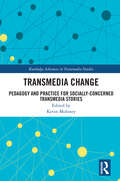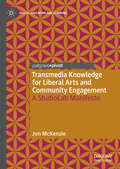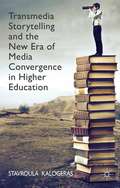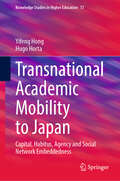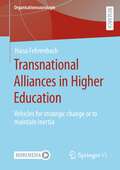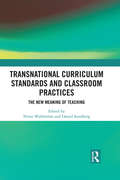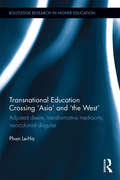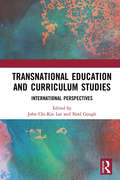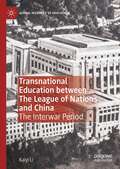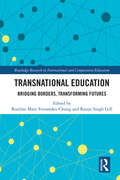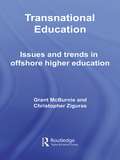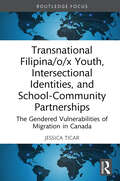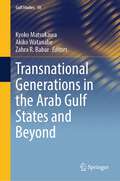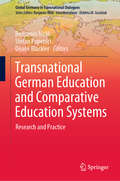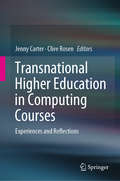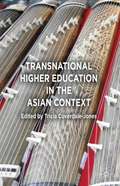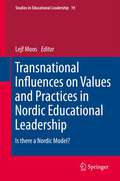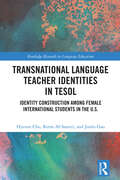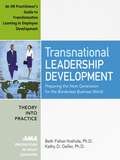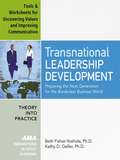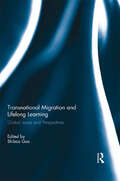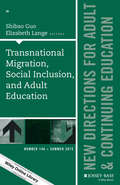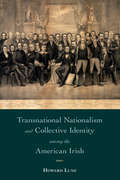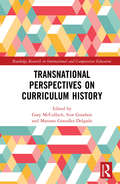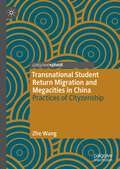- Table View
- List View
Transmedia Change: Pedagogy and Practice for Socially-Concerned Transmedia Stories (Routledge Advances in Transmedia Studies)
by Kevin MoloneyThis book examines and illustrates the use of design principles, design thinking, and other empathy research techniques in university and public settings, to plan and ethically target socially-concerned transmedia stories and evaluate their success through user experience testing methods. All media industries continue to adjust to a dispersed, diverse, and dilettante mediascape where reaching a large global audience may be easy but communicating with a decisive and engaged public is more difficult. This challenge is arguably toughest for communicators who work to engage a public with reality rather than escape. The chapters in this volume outline the pedagogy and practice of design, empathy research methods for story development, transmedia logics for socially-concerned stories, development of community engagement and the embrace of collective narrative, art and science research collaboration, the role of mixed and virtual reality in prosocial communication, ethical audience targeting, and user experience testing for storytelling campaigns. Each broad topic includes case examples and full case studies of each stage in production. Offering a detailed exploration of a fast-emerging area, this book will be of great relevance to researchers and university teachers of socially-concerned transmedia storytelling in fields such as journalism, documentary filmmaking, education, and activism.
Transmedia Knowledge for Liberal Arts and Community Engagement: A StudioLab Manifesto (Digital Education and Learning)
by Jon McKenzieThis book sets forth a pedagogy for renewing the liberal arts by combining critical thinking, media activism, and design thinking. Using the StudioLab approach, the author seeks to democratize the social and technical practices of digital culture just as nineteenth century education sought to democratize literacy. This production of transmedia knowledge—from texts and videos to comics and installations—moves students between seminar, studio, lab, and field activities. The book also wrestles with the figure of Plato and the very medium of knowledge to re-envision higher education in contemporary societies, issuing a call for community engagement as a form of collective thought-action.
Transmedia Storytelling And The New Era Of Media Convergence In Higher Education
by Stavroula KalogerasIn the age of media convergence, stories have morphed into new forms yet their core purpose remains the same, which is to pass on knowledge and information. This book argues that the inherent interactivity of the internet and the emotional engagement of story can lead to innovative pedagogies in media-rich environments.
Transnational Academic Mobility to Japan: Capital, Habitus, Agency and Social Network Embeddedness (Knowledge Studies in Higher Education #17)
by Hugo Horta Yifeng HongThis book addresses agency and habitus development of migrant academics in Japan and reveals the complexity of international academic mobility in East Asian contexts. It addresses differentiated transnational academic mobility routes and route-confined capitals and dispositions, the effect of stratified social networks and network embeddedness on international academic mobility, and the effect of unequal globalization and the asymmetrical internationalization of international academic mobility. The book highlights the roles of transnationally stretched social network development and network embeddedness along life trajectories, locating them as critical infrastructures of mobilities and identifying an array of individual social network building and maintenance strategies and principles. It illustrates how familial, educational, academic and social networks across borders facilitate and channel flows of capitals and resources vital for academic performance and upward academic mobility of migrated academics. It draws on a range of theoretical frameworks of Bourdieusian theory of sociology, transnationalism and qualitative social network analysis. The research is based on 26 case studies of migrant scholars in Japan, using narrative inquiry and qualitative social network analysis. The work provides multiple implications for practitioners, policy makers and researchers who seek answers to the sustainability of the internationalization of higher education in Asia Pacific and emerging higher education hubs.
Transnational Alliances in Higher Education: Vehicles for strategic change or to maintain inertia (Organisationssoziologie)
by Hana FehrenbachHana Fehrenbach’s book examines organizational level transnational strategic alliances. Through the perspectives of dynamic capabilities and neo-institutionalism, the study explores the interplay of rationales, pathways and benefits of transnational alliances over time of leading universities of technology (TU9) in Germany. Complex inter-connected dynamics at the macro (i.e. society), meso (i.e. organization) and micro-levels (i.e. individual) are examined in this qualitative study driven by a deductive approach. These interrelated dynamics are then reflected in a recursive process model called STANCE, which depicts how through these types of alliances, institutions of higher education position themselves in single or multiple organizational fields to gain (more) strategic and social fitness. The study is timely, considering the paucity of comprehensive and theoretically anchored research on this contemporary phenomenon, and the need for policy-makers and senior leadership to make evidence-based decisions.
Transnational Curriculum Standards and Classroom Practices: The New Meaning of Teaching
by Ninni Wahlström Daniel SundbergFocusing on the meaning of teaching, Transnational Curriculum Standards and Classroom Practices contributes to a deepened understanding of what it means to be a teacher in an institutional context ranked high on the policymakers’ agenda. While the policy literature emphasises efficiency in teaching, educational research demonstrates an awareness of the importance of alternative perspectives on what makes for successful teaching. This book critically examines the conditions and dimensions of teaching as framed in current policy discourse and situates school education in relation to wider societal issues. Based on a four-year research project financed by the Swedish Research Council and drawing on international policy discourse, as well as international research, the chapters in this book contribute to the knowledge of relations and influences between international educational reform movements, national curriculum reforms, and implications for teaching and learning practices at the classroom level. Offering results and reflections from comprehensive comparative classroom studies, the book makes a distinctive contribution to our knowledge of the implications of policy for teachers and students. This book should be essential reading for academics, researchers and postgraduate students interested in the relationship between the curriculum and teaching in a contemporary context, as well as those engaged in the study of education policy, curriculum theory, pedagogy and educational leadership. It should also be of great interest to policymakers and teachers.
Transnational Education Crossing 'Asia' and 'the West': Adjusted desire, transformative mediocrity and neo-colonial disguise (Routledge Research in Higher Education)
by Le-Ha PhanIn this book, Phan Le-Ha identifies and discusses four growing self-sustained/sustaining fundamental phenomena in transnational education (TNE), namely (1) the planned, evolving and transformative mediocrity behind the endorsement of English-medium education legitimized by the interactive Asia-the West relationship; (2) the strategic employment of the terms ‘Asia/Asian’ and ‘West/Western’ by all stakeholders in their perceptions and construction of choice, quality, rigour, reliability and attractiveness of programs, courses, and locations; (3) the adjusted desire for an imagined (and often misinformed) ‘West’ among various stakeholders of transnational education; and (4) the assigned and self-realized ownership of English by otherwise normally on-the-margin groups of speakers. A focus on how these phenomena impact questions of identity and desire in TNE is a running theme. The above phenomena are discussed against the backdrop of ‘the rise of Asia’ sentiment and how this sentiment has played out in interactions and relationships between ‘the West’ and ‘Asia’ and among Asian institutions and various entities. Phan Le-Ha’s examination of the identified phenomena in TNE has been informed by her multi-layered engagement with the dialectic of the Asia-the West relationship, her critical take on certain pro-Asia and decolonisation scholarship, and her interdisciplinary and multidisciplinary approach to theorise the field and the specific topic under scrutiny. Phan Le-Ha shows that the current Asia chooses (not necessarily by force but largely by will and often with an informed and well-articulated agency) to go with the idea of the West and often desires an affiliation with the West either directly or indirectly, something that is getting more intense in the context of globalization, regionalization, and commercialization of education. The rise of Asia has made the idea of the West even more looked-for in Asia. TNE in Asia, in many ways, is the transforming and dynamic transit point, a layover that facilitates entry into a wanted destination – the West and/or the idea of the West. The West and Asia need one another more than ever in the context of the internationalization and commercialization of higher education. What’s more, the West and Asia have hardly ever been mutually exclusive but have rather been in an eventful love-and-obsession relationship with each other. This is the very dialectic proposition that Phan Le Ha takes throughout this book while paying specific attention to transnational higher education in the greater Asian region including the Middle East, following her several research projects conducted in the region since 2005 to date. Transnational Education Crossing 'the West' and 'Asia' explores: • English, Internationalisation of Higher Education, and Identity: Increasing Academic Monolingualism and English-only Package • Transnational Education and Dream Realization: From the Philippines to Vietnam, From Afghanistan to Dubai, From Everywhere in Asia to Thailand • Desiring International /Transnational Education: Theorisation of Key Concepts and Next Steps from Here The book will be of interest to researchers in the field of transnational education, Asia education and education policy.
Transnational Education and Curriculum Studies: International Perspectives
by John Chi-Kin LeeIn recent years, there has been increasing attention placed on international and transnational aspects of school and higher education curricula, and the different research approaches and lenses through which these issues are studied. This edited volume explores diverse perspectives and discourses of curriculum studies contributed by scholars both within and outside the "majority world". In addition, it tackles both transnational cross-border endeavours involving national governments and policy measures, and the promises, challenges and failings of those formal relationships. The book consists of three sections. The first section provides an introduction and overviews of transnational education in connection with curriculum studies, schooling and higher education. The second section deals with transnational and international perspectives on curriculum studies, schooling and education. The final, third section highlights transnational and international perspectives on higher education. This timely volume tackles the questions often posed by curriculum scholars and educational researchers around the possibility of a transnational approach to curriculum studies and how (and if) a common set of means can transcend national boundaries and sensitivities. It looks at the common issues and problems across nations that international and transnational curriculum and educational research work could address. This volume will appeal to researchers and policy makers interested in transnational education and curriculum studies.
Transnational Education between The League of Nations and China: The Interwar Period (Global Histories of Education)
by Kaiyi LiThis volume examines transnational educational transfer between China and the League of Nations during the interwar period. By analysing the educational activities of the League of Nations with China, he book enriches the study of the history of the League of Nations by turning the focus to affairs that exceed the scope of traditional international relation and focusing on ways in which international organizations engaged in international educational endeavors. Adopting a transnational perspective, the book moves beyond conventional national-centered historiography, thus contributing to the understanding of how educational ideas, media, and policies circulate between different nations.
Transnational Education: Bridging Borders, Transforming Futures (Routledge Research in International and Comparative Education)
by Rozilini Mary Fernandez-Chung Ranjit Singh GillThis book explores the rapidly expanding world of cross-border education. As international student numbers have surged from 1.6 million in 2000 to over 6.4 million in 2022, transnational education (TNE) has become a transformative force in global higher education. This volume delves into how universities cross borders to deliver education, exploring models ranging from international branch campuses to digital learning platforms.Drawing on rich case studies from Asia, the Middle East, and beyond, the book examines four key dimensions of TNE: alignment with sustainable development goals, cross-border governance frameworks, regional cultural dynamics, and student experience. It offers a detailed analysis of established TNE markets like Malaysia and the Gulf states while uncovering developments in emerging hubs such as Sri Lanka and Vietnam. The contributors examine critical questions of quality assurance, cultural adaptation, and institutional partnerships that shape modern TNE. This book is an essential resource for policymakers, educators, and institutional leaders in an increasingly interconnected world. By offering practical strategies and forward-looking insights, it equips readers to navigate the complexities of TNE and leverage its potential to address pressing global challenges, from educational inequality to workforce development – a vital guide for shaping the future of international education.
Transnational Education: Issues and Trends in Offshore Higher Education
by Christopher Ziguras Grant McBurnieWhile the international mobility of students is a well-established feature of higher education, the international mobility of institutions and courses on a large scale is a more novel phenomenon. Transnational education is at the leading-edge of the most fundamental changes taking place in higher education today. Topics discussed in this new volume include: the extent and form of offshore activity the pedagogical and cultural controversies that have plagued transnational education the challenges it presents to governments, educators and HE managers how governments are developing forms of regulation to integrate cross-border programs and branch-campuses into their strategic planning for the sector the new opportunities for students and institutions. Transnational Education presents a global perspective on the development of international online education, partner-supported transnational programs and international branch campuses. It provides a comprehensive and analytical account of the active role some universities are playing on the international stage and offers valuable guidance on future trends in the sector.
Transnational Filipina/o/x Youth, Intersectional Identities, and School-Community Partnerships: The Gendered Vulnerabilities of Migration in Canada (Routledge Critical Studies in Gender and Sexuality in Education)
by Jessica TicarThis book provides an in-depth examination of how Filipina mothers, serving as migrant caregivers, and their children navigate the experiences of family separation and reunification through Canada’s Live-in/Caregiver Program (L/CP).It analyses how Filipina/o/x youth understand their political agency, the legacy of colonialism, and their sense of identity and belonging in urban schools through school-community partnerships. The work examines the global migration experiences of transnational Filipina/o/x youth and their mothers in nation-states such as Canada through the lens of the global domestic work industry. It connects the theoretical frameworks of critical and intersectional feminisms within a transnational context to the specificity of settler colonialism within Canada, a white settler nation-state. It underscores the pivotal role of school-community partnerships in facilitating the political agency of Filipina mothers and their children, and in shaping Filipina/o/x youths’ transnational identities through equitable educational policies and, ultimately, im/migration policies and practices. This book is a valuable addition to the discourse on global migration, transnational feminism, and critical race studies in education.The book primarily targets scholars, researchers, graduate students in the fields of Gender Studies, Education, Psychology, Mental Health, Immigration/Transnational Studies, and Asian Canadian Studies. It is particularly relevant for those with specialist knowledge in Gender and Immigration Studies, as well as Equity and Social Justice Education, which includes a focus on supporting the participation of racialized im/migrants in the school system.
Transnational Generations in the Arab Gulf States and Beyond (Gulf Studies #10)
by Zahra R. Babar Kyoko Matsukawa Akiko WatanabeThis book examines the recent migration phenomenon in the Arab Gulf states for work and residence. It sheds light on the transnationality of diverse groups of migrants from different generations, and unpacks how migrants’ multiple senses of belonging, orientations and adaptive strategies have shaped contemporary migration in the Gulf region. In turn, the analysis presented here shows how the Arab Gulf states’ citizenship and educational policies affect second-generation migrants in particular. Through a series of fine-grained ethnographic case studies, the authors demonstrate the ways in which these second-generation migrants construct their identities in relation to their putative ‘home’ country in the Gulf as well as their complex relationship to their parents’ countries of origin. This is what underpins the deeply transnational character of their lives, choices and notions of belonging. While migration scholars often situate these groups as ‘temporary’, this does not in fact capture the reality of temporariness for the migrants themselves, their children or their dependants. The result is a complex and ongoing construction of identity that shapes the way of life for millions of migrants. Relevant to scholars of migration and international studies, particularly focused on the Middle East, Transnational Generations in the Arab Gulf States and Beyond is also of interest to social scientists researching student mobility in higher education, intergenerational families, identity politics and globalisation.
Transnational German Education and Comparative Education Systems: Research and Practice (Global Germany in Transnational Dialogues)
by Benjamin Nickl Stefan Popenici Deane BlacklerThis book presents an in-depth look at the state of transnational education and comparative perspectives on education systems between Germany and other nation states. It explores how a transnational education identity in secondary and tertiary institutions has developed in the German and other national contexts and which lessons can be learned from current challenges and successes of education systems. It uses detailed case studies to promote critical rethinking of current educational practices in high schools and universities, specifically of race, gender, religion and learner ability in educational settings. It understands learning and teaching as an arena to discuss transnational education opportunities in the 21st century as an emerging or evolving discourse on contemporary forms of transnationalism.
Transnational Higher Education in Computing Courses: Experiences and Reflections
by Jenny Carter Clive RosenThere has been exponential growth in transnational education (TNE) in the last few years as UK universities have looked to expand their markets. Recipient countries have sought short cuts to developing their higher education provision which has proved a lucrative income stream for some universities. But overseas collaborations are not without risk. Recipient countries can be concerned with external influence over curricula, quality being diluted and higher education being infected by neo-imperialism. These concerns are not without foundation. There are risks for providers too. Reputations can be damaged if academic standards are compromised. Conflicts of interest can occur between quality of provision and the pot of gold on offer. Staff can view overseas collaborations as distracting from their research and commitment to home students. Computing is a particularly popular subject for TNE, but critical thinking, analysis, independent learning, and creativity can be compromised. Preventing plagiarism is difficult. Constant changes in technology result in constant curricula revision which causes severe problems for overseas collaborations. This book focuses on TNE in the computing domain. However cross-cultural issues challenge TNE management and administration whatever the subject area. If the ever present tensions are not continuously monitored they can quickly threaten the sustainability of the collaboration. This book identifies many of the threats and some of the solutions. The readership for this book is truly global. Any international development officer in higher education considering an overseas collaboration will benefit from this book. Any academic becoming engaged in, or already involved with a TNE partnership, either as provider or recipient, will gain information and insight into the practice and issues. Researchers in TNE will discover more lines of enquiry. Students considering a course with an overseas provider or in coming to the UK to study will be better prepared thereby enabling a more fulfilling and rewarding experience. Anyone who has an interest in TNE, whether at the senior executive level, operational level, delivering programmes or as a recipient of TNE should read this book. The wealth of experience gathered here will provoke questions, prompt debate and offer solutions. It has been written by people who know the issues, bear the scars and are happy to share their knowledge. It will greatly benefit future transnational collaborations.
Transnational Higher Education in the Asian Context
by Tricia Coverdale-JonesThis book offers new insights and perspectives on internationalization and trans-national higher education (TNHE) with contributions from three continents. These include the student experience in Malaysia, China, Japan and India as well as institutional perspectives and pedagogical implications of new research.
Transnational Influences on Values and Practices in Nordic Educational Leadership
by Lejf MoosThis book explores to what extent transnational influences change national/local values and practices in the Nordic educational systems. It provides country cases and thematic chapters that give nuanced insights into the influence of transnational agencies on national governance and discourses. It describes how national discourses and regulation influences school leadership values, culture and practice, in competition with traditional values. The transnational and global discourse on educational leadership is mostly formed according to Anglo-American thinking and tradition. Pivotal foundations of this discourse are strong hierarchical societies/class societies with liberal democracies, and clearly streamed education systems. The Nordic discourse, however, builds on a more equal society and flat hierarchies with participatory democracy, and on comprehensive schooling with strong local community roots. Leadership thinking and practices are formed by the culture and context they are part of: they are primarily shaped by the national/local values, traditions and practices, and only partially shaped by politics, discourses and literature. Due to the fact that a great deal of the literature that is being used in the Nordic contexts is of Anglo-American origin and many of the research projects have Anglo-American foundations, it is difficult to distinguish the sources for leadership thinking and practice. This book distinguishes the Nordic from the Anglo-American thinking and presents important findings and arguments for leadership practitioners inside as well as outside the Nordic countries.
Transnational Language Teacher Identities in TESOL: Identity Construction Among Female International Students in the U.S. (Routledge Research in Language Education)
by Hyesun Cho Reem Al-Samiri Junfu GaoDrawing on Bakhtin’s notion of ideological becoming and the concepts of intersectionality and transnationalism, this volume offers a unique conceptual framework to explore and better understand the identity construction and negotiation of international TESOL students. Focusing on female graduate students studying in the U.S., the text utilizes rich narratives to illustrate how nuanced language teacher identities develop through complex dialogic processes relating to language, race, and gender—as well as migration experiences—and individuals’ integration in academic and professional communities. Ultimately, the text contests deficit reductionist views of transnational students that are implied by educational policies and administration. This text will benefit scholars, academics, and students in the fields of bilingualism, TESOL, multicultural education, and language identity more broadly. Those involved with teaching and teacher education, as well as language and culture in general, will also benefit from this book.
Transnational Leadership Development: An HR Practioner's Guide to Transformative Learning in Employee Development - Appendix 2
by Beth Fisher-Yoshida Kathy D. GellerTransnational Leadership Development acquaints readers with the paradoxes and mental processes leaders need to relate successfully to people with different backgrounds, cultures, and societal identities. This appendix helps translate the transformative learning process into a process that HR professionals can use in employee interventions and learning experiences. It explains six dynamics necessary to provide a context for an intervention plus examples of how to apply it to conflict management.
Transnational Leadership Development: Tools and Worksheets for Uncovering Values and Improving Communication - Appendix 1
by Beth Fisher-Yoshida Kathy D. GellerTransnational Leadership Development acquaints readers with the paradoxes and mental processes leaders need to relate successfully to people with different backgrounds, cultures, and societal identities. This appendix includes tools to facilitate communication including a social identity map, values charts, reflection worksheets, strategy planning tools, a dialog model, guided questions and tips.
Transnational Migration and Lifelong Learning: Global Issues And Perspectives
by Shibao GuoEconomic globalization, modern transportation, and advanced communication technologies have greatly enhanced the mobility of people across national boundaries. The resulting demographic, social, and cultural changes create new opportunities for development as well as new challenges for lifelong learning. Transnational Migration and Lifelong Learning examines the changing nature of lifelong learning in the current age of transnational migration. The book brings together international scholars from a range of countries in a dialogue about the relationship between work, learning, mobility, knowledge, and citizenship in the context of globalization and migration. It covers a wide range of topics, including: global perspectives and analyses of migration; the impact of migration on lifelong learning; processes of exclusion and inclusion in lifelong learning; the tension between mobility, knowledge, and recognition; and transnationalism, learning communities, and citizenship. This book was originally published as a special issue of the International Journal of Lifelong Education.
Transnational Migration, Social Inclusion, and Adult Education: New Directions for Adult and Continuing Education, Number 146 (J-B ACE Single Issue Adult & Continuing Education)
by Shibao Guo Elizabeth LangeAs a result of transnational migration, many countries are becoming increasingly ethnoculturally diverse, creating both new opportunities and challenges for practices of adult education. This volume examines the changing nature of adult education in the age of increased transnational migration and: • synthesize the latest research, policies, and practices in transnational migration and adult education, • examines the larger historical and structural issues of race and gender in immigration and newer theories, such as diaspora studies, in relation to adult education, and • provides examples and recommendations for enhancing socially just and inclusive adult education environments for newcomers. Transborder injustices and multiple dimensions of social justice permeate immigration dynamics and challenge adult educators to rethink social justice in a transnational age.This is the 146th volume of the Jossey Bass series New Directions for Adult and Continuing Education. Noted for its depth of coverage, it explores issues of common interest to instructors, administrators, counselors, and policymakers in a broad range of education settings, such as colleges and universities, extension programs, businesses, libraries, and museums.
Transnational Nationalism and Collective Identity among the American Irish
by Howard LuneIn Transnational Nationalism and Collective Identity among the American Irish, Howard Lune considers the development and mobilization of different nationalisms over 125 years of Irish diasporic history (1791–1920) and how these campaigns defined the Irish nation and Irish citizenship. Lune takes a collective approach to exploring identity, concentrating on social identities in which organizations are the primary creative agent to understand who we are and how we come to define ourselves. As exiled Irishmen moved to the United States, they sought to create a new Irish republic following the American model. Lune traces the construction of Irish American identity through the establishment and development of Irish nationalist organizations in the United States. He looks at how networks—such as societies, clubs, and private organizations—can influence and foster diaspora, nationalism, and nationalist movements. By separating nationalism from the physical nation, Transnational Nationalism and Collective Identity among the American Irish uniquely captures the processes and mechanisms by which collective identities are constructed, negotiated, and disseminated. Inevitably, this work tackles the question of what it means to be Irish—to have a nationality, a community, or a shared history.
Transnational Perspectives on Curriculum History (Routledge Research in International and Comparative Education)
by Ivor Goodson Gary McCulloch Mariano González-DelgadoThis book offers a remarkable range of research that emphasises the need to analyse the shaping of curricula under historical, social and political variables. Teachers’ life stories, the Cold War as a contextual element that framed curricular transformations in the US and Europe, and the study of trends in education policy at transnational level are issues addressed throughout. The book presents new lines of work, offering multidisciplinary perspectives and provides an overview of how to move forwards. The book brings together the work of international specialists on Curriculum History and presents research that offers new perspectives and methodologies from which to approach the study of the History of Education and Educational Policy. It offers new debates which rethink the historical study of the curriculum and offers a strong interdisciplinary approach, with contributions across Education, History and the Social Sciences. This book will be of great interest for academics and researchers in the fields of education and curriculum studies. It will also appeal to educational professionals, teachers and policy makers.
Transnational Student Return Migration and Megacities in China: Practices of Cityzenship
by Zhe WangThis book is a study of the return migration of overseas Chinese students. By 2018, over 3.5 million Chinese students had returned from overseas universities to China, with the megacities of Beijing, Shanghai, and Shenzhen representing by far their main destinations. In other words, when overseas students return to China, many do not return to their hometown but usually land, work and settle down in Beijing, Shanghai and Shenzhen. Their return migration is thus not only transnational, but also internal-urban. This book adopts a multi-level geographical analysis to explore this important phenomenon, exploring why and how returnees choose these three cities and how they experience and interpret their everyday lives in these megacities after their return. In doing so, it highlights the importance of cultural logics and multiscalar thinking of transnational Chinese students’ return migration and illuminates how their transnational migration reproduces domestic socio-spatial inequalities. This book brings an important contribution to the fields of Cultural Geography, Urban Geography, Transnationalism, Migration Studies and Citizenship Studies.
